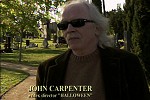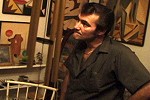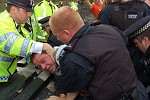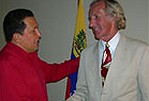 Shadows off the beaten path
Shadows off the beaten pathTAKING LIBERTIES | THE WAR ON DEMOCRACY
< < D O C S > >
last update 4.Jul.07
See also: SHADOWS FILM FESTIVAL
 R E V I E W B Y R I C H C L I N E
R E V I E W B Y R I C H C L I N E
 This doc traces the rise of the slasher horror movie; it's not particularly deep or provocative, but it is a lot of fun.
This doc traces the rise of the slasher horror movie; it's not particularly deep or provocative, but it is a lot of fun.
Horror has been around forever. Ancient civilisations enjoyed watching people being killed by animals, and people throughout history have been fascinated with mass murderers, leading to Paris' Grand Guignol theatre of the macabre and early films like Powell's Peeping Tom and Hitchcock's Psycho. Then came the boogeyman in 1978: both in Jonestown and in Carpenter's Halloween. Followed by Friday the 13th's gratuitous gore, A Nightmare on Elm Street's gleeful villain and the ongoing search for even more gruesome on-screen deaths.
Along the way, we see the birth of the shock ending (De Palma's Carrie), the influence of spaghetti slashers (Argento's Suspiria) and the backlash that led to class (Demme's The Silence of the Lambs) and post-modern wit (Craven's Scream), then today's less thrilling torture-oriented hits (like Hostel and Saw).
This lively doc looks from every conceivable angle, including the critics' reaction and how these films reflect society--Aids, Reagan's politics, suburban angst, body culture. There's an intriguing examination of misogyny, pointing out that the most die hard fans tend to be female, and also a look at why these films are made and why people wan to watch them, plus the impact on cinema at large.
But there's never much about how these films have moulded pop culture and attitudes to violence and sex. To be fair, one astute question is asked: Do sweet family movies make society a better place? And there's an intriguing anti-war element, since death-effects guru Savini learned his craft as a Vietnam photojournalist.
But it's basically an E! True Hollywood Story-style romp through clips, interviews and glimpses of stars started in slasher cinema, including Tom Hanks, Johnny Depp, Holly Hunter, George Clooney and Renee Zellweger. Still, fans will love the history and behind-the-scenes segments, including traditions, internal morality and twisted back-stories behind films in which the only thing we care about is how the next person will meet their maker.
scr Adam Rockoff
with John Carpenter, Wes Craven, Tom Savini, Rob Zombie, Stan Winston, Sean S Cunningham, Betsy Palmer, Joseph Stefano, Jeff Katz, Paul Lynch, Harry Manfredini, Gregory Nicotero
 release US 13.Oct.06,
release US 13.Oct.06, UK 25.Jun.07 dvd
06/US ThinkFilm 1h28
16.Jun.07
 R E V I E W B Y R I C H C L I N E
R E V I E W B Y R I C H C L I N E
 This astoundingly personal documentary grips us with its sheer audacity as, right before our eyes, the filmmaker opens the door on the biggest skeleton in his closet.
This astoundingly personal documentary grips us with its sheer audacity as, right before our eyes, the filmmaker opens the door on the biggest skeleton in his closet.
After nearly 30 years, Maringouin takes his camera when he returns to Louisiana to meet his father, the cubist painter Johnny Roe. We see Maringouin arrive at the house, and from then on we only see what he sees. Johnny lives with his common-law wife Marie in drugged-out oblivion. She's using his recent hip replacement surgery (the film's is his post-op nickname) to stock up on prescription meds, and they're both so dazed that they don't really notice that they're living in squalor.
Years of history fill each conversation--private jokes, memories, old pictures (the photo album is called "The Book of Nuts"). And the clutter and decay around Johnny and Marie are echoed in the way their lives have fallen apart. Through their banter, it emerges that the last time Johnny saw his son was when he was arrested for trying to kill his wife and baby John. The film is structured in a series of random chapters, mostly featuring interaction between Johnny and Marie, as well as "Uncle" Stanley, their larger-than-life friend who always wanted to be a tough-guy Hollywood star but stayed home caring for his dying mother and deranged cat.
The film is somewhat meandering and aimless, like watching an especially trashy episode of Big Brother. It's also a riot of outrageous discussions about drugs and death ("If we lose consciousness, the cats will eat our faces"), yet Maringouin discovers the sad dignity within these people. In some ways they're just wounded souls trying to get on with their lives. There's a sense of regret, hints of inner demons and a lot of very funny sarcastic dialogue. Plus an intriguing series of climactic events (including Hurricane Katrina) and an oddly blissful coda.
Maringouin puts his soul on the line, opening himself up to these people even as he shows us everything. Watching this from his point of view is harrowing, mainly because we're forced to react without knowing what he thinks about it all. In this way, the film is like a raw, rough, more numbing variation on Tarnation: therapy for the filmmaker, car-crash cinema for the audience. Either way, it's unmissable.
with Johnny Roe Jr, Virgie Marie Pennoui, Stanley Laviolette, John Maringouin
 release UK 27.Jul.07
release UK 27.Jul.0707/US 1h25
LONDON FILM FEST
6.Jun.07
 R E V I E W B Y R I C H C L I N E
R E V I E W B Y R I C H C L I N E
 MUST-SEE
MUST-SEE
 This doc's disarmingly entertaining style is reminiscent of Michael Moore's work. But Atkins avoids the polemic approach, merely observing like a true documentarian. The result is unambiguous and urgent--and unmissable.
This doc's disarmingly entertaining style is reminiscent of Michael Moore's work. But Atkins avoids the polemic approach, merely observing like a true documentarian. The result is unambiguous and urgent--and unmissable.
As our politicians talk about liberty, democracy and the war on terror, we are ignoring what's actually happening here at home. Our own freedoms have been completely eroded by governments willing to shred history. This film examines how Britain's government has undermined five key civil rights guaranteed by the Magna Carta and the European Convention on Human Rights. Everything is shown straight from the headlines, and yet the real truth overturning nearly a thousand years of freedom and democracy. And opening us up to a real possibility of ruthless tyranny.
It shows in no uncertain terms that the British public no longer has the right to protest, freedom of speech, the right to privacy, the assumption of innocence until proven guilty, the guarantee not to be detained without charge or protection from torture. It's impossible to over-stress the importance of this film. Government leaders claim that "we won't let the terrorists change our way of life", then they proceed to dismantle that very way of life. And we let them.
Each example shown in this film is harrowing and unnerving, never exaggerated to manipulate our opinion--from the two people repeatedly arrested for daring to read out names of dead Iraqi civilians to two young sisters locked up in isolation for 36 hours while the police raided their family's home in the middle of the night.
We meet Mouloud Sihali, acquitted of involvement in the fabricated "North London ricin plot", and yet still under house arrest today. John Catt was charged under the Terrorism Act for wearing an anti-Blair t-shirt. Moazzam Begg was tortured in Bagram and Guantanemo without charge for three years. Walter Wolfgang, age 82, was arrested as a terrorist for shouting, "Nonsense!" at the 2005 Labour Party Conference. These are things we expect from a totalitarian dictatorship, not our leaders.
The filmmakers tellingly weave in historically relevant events like the Suffragette movement, Hitler's rise in the late 1930s, and Britain's 1990 poll-tax riots. There's also contemporary footage that clearly shows how our leaders have changed before our eyes. This is far more than shameful; this is horrific material, assembled with clarity and skill in an engaging, riveting way. We must open our eyes. And raise our voices.
narr Ashley Jensen, David Morrisey
with Mark Thomas, Boris Johnson, Tony Benn, Clare Short, Andrew Gilligan, Martin Bell, Kate Allen, Max Hastings, Ken Clarke, Henry Porter, Michael Mansfield, Eric Metcalfe
 release UK 8.Jun.07
release UK 8.Jun.0707/UK 1h45
"When the people fear their government, there is tyranny; when the government fears the people, there is liberty."
Thomas Jefferson
"Those who would give up essential liberty to purchase a little temporary safety deserve neither liberty nor safety."
Benjamin Franklin
"Of all tyrannies, a tyranny sincerely exercised for the good of its victims may be the most oppressive."
C.S. Lewis
21.May.07
 R E V I E W B Y R I C H C L I N E
R E V I E W B Y R I C H C L I N E
 It's no secret that the United States has virtually enslaved the economies of Latin America for its own interests. Reporter-filmmaker Pilger forcefully examines how this policy has undermined democracy and liberty. And how the people are fighting back.
It's no secret that the United States has virtually enslaved the economies of Latin America for its own interests. Reporter-filmmaker Pilger forcefully examines how this policy has undermined democracy and liberty. And how the people are fighting back.
Pilger doesn't pull his punches. This film is alarming and absolutely riveting, even though it feels both one-sided and heavy-handed. Yet for every interview that feels contrived or staged, there's another one that bristles with raw honesty, digging beneath the surface to show a side of the story the media rarely reports.
Pilger starts in Venezuela, a hot spot for populist Latino politics. In an extensive and intriguingly casual interview with President Chavez, the film traces the country's recent history, including the political and economic interests that have tried repeatedly to undermine Chavez's efforts to improve health care and education for the poor people in his country. "We don't want wealth," he says. "We want life with dignity." And yet the US government helped organise a violent coup against him, and continues to use false media reports to paint him as a communist villain.
The film also explores situations in Guatemala, Chile and Bolivia over the past 50 years, during which time America has backed some 50 coup attempts in the name of preserving "US interests". It's quickly clear that democracy and liberty have nothing to do with this; it's all about money and control. True democracy--of the people, by the people, for the people--is actually what's happening in Venezuela under Chavez and Bolivia under Morales. But this challenges America's stranglehold on the continent, so these men are vilified.
The material here is tragic and deeply compelling, and eerily relevant to what's happening elsewhere (torture victim Ortiz, an American nun who was working in Guatemala, astutely compares her ordeal to Abu Ghraib). The USA has so much blood on its hands that continued denial is insulting. George W Bush's so-called "economic miracle" is a blatant lie, as the rich get richer and poverty spreads.
So it's a shame that Pilger pushes things with unconvincing interviews and deadpan derision (hilarious as it may be). The only voices against his perspective are utterly bonkers, from former Secretary of State Noriega lying through his teeth to former CIA chief Clarridge's inane bluster. Even so, it's vitally important that Pilger keeps opening the books on what's really happening in "America's back yard".
scr John Pilger
with John Pilger, Hugo Chavez, Duane Clarridge, Roger Noriega, Howard Hunt, Jose Serrano, Philip Agee, Dianna Ortiz, Sara De Witt, Mariela Machado, John Vink, Eva Gollinger
 release UK 15.Jun.07
release UK 15.Jun.0707/UK 1h36
31.May.07


See also: SHADOWS FILM FESTIVAL | SHORT FILMS
© 2007 by Rich Cline, Shadows
on the Wall